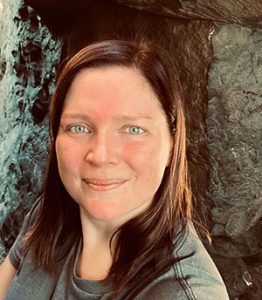 DAV benefits advocate finds 13-year-old error, veteran receives earned benefits
DAV benefits advocate finds 13-year-old error, veteran receives earned benefits
Mere days before her 12th birthday in 1993, Jamesina Cote lost her mother after she went missing from a park and ride near an interstate in Montpelier, Vermont. Cote’s mother—Audrey Groat—is still listed as a missing person today.
Cote and four of her sisters entered into the foster care system. When she turned 18, she enlisted in the Navy and trained to be an operations specialist.
In 1999, her first assignment was on the dock landing ship USS Fort McHenry, near Sasebo, Japan. She said her initial excitement led her to believe she’d spend her next two decades serving in uniform.
“It was definitely a huge change for me because I grew up in Vermont where there’s not a lot of diversity,” said Cote. “So in the beginning it was like just a whole new experience. I was very excited, and I did very well. I increased pay grades quickly. I wanted to learn everything I could about my job. And then it took a turn for the worse.”
One of only a few women on the ship, and the only female on her shift, Cote started experiencing harassment from her fellow sailors. After an escalation from verbal threats to unwanted physical contact, she reported it to her chain of command.
Soon after, two of her shipmates dragged her into a supply closet and raped her. Cote said she believes the sexual assault was retaliation for her complaint.
“I was stuck on the ship because we were out to sea,” Cote recalled. “There was nowhere I could go, I was petrified. My only goal was to survive.”
Once the ship docked, Cote immediately requested to see a psychiatrist. She was given a choice to go to another duty station or to be medically discharged from the military. She chose to be separated, ending her dream of having a career in the Navy.
Cote said she blocked out the trauma and refused to talk about it or deal with the after effects for years. In 2007, she decided to seek treatment. Her VA doctor recommended she file for service-connection for her PTSD, but her claim was denied as the VA determined her PTSD was pre-existing.
It wasn’t until 2020 when Cote—based on the advice of her new doctor—decided to reach out to DAV and see if there was anything that could be done.
“When she first came in to my office, I did a record review and found that she had buddy statements and a medical opinion that her condition was at least aggravated by the sexual assault,” said National Service Officer Supervisor William Cvelbar.
Ultimately, Cvelbar was able to get Cote service connected based on the evidence they presented. But he didn’t stop there.
“[After the decision] I was looking back through her file to see if I could understand why she had been denied 13 years beforehand,” Cvelbar said. “I noted her appeal from the 2007 PTSD claim was closed for her Form 9 not being timely.”
That didn’t sit right with Cvelbar. So after some more digging, he discovered there was a discrepancy on the dates for the cover letter and on the statement of the case itself. He consulted with Cote about his findings, and together they decided to submit a higher level review.
“I told Jamesina I would fight this through appeal if she was on board,” he said. “I warned her we could have a battle on our hands, but if she was willing, I would do whatever it takes because I found a clear and unmistakable error.”
The VA decision review officer agreed there was an error on the original claim, granting an earlier effective date of 2007, ultimately providing Cote and her daughter retroactive benefits and peace of mind.
“I’m able to move closer for treatment and to my family now,” Cote said. “I’ve worked really hard in therapy and trying different things to help [with PTSD symptoms] but it’s so time consuming I wasn’t sure how I was going to pay for a quality life for my daughter. Now I don’t have to worry as much, my daughter will be taken care of.”
Cvelbar said he was happy Cote was finally going to be awarded the benefits she had earned, but even more so because he thought she was finally shown the support she needed to continue her recovery.
“Not only does this case show us how getting the right documentation can help with a veteran’s appeal, but it shows us attention to detail can literally change a person’s life,” said National Service Director Jim Marszalek. “Bill went back 13 years and found an error that resulted in a life-altering decision.”
“[Eventually] I want to help veterans who are in the same boat, I could be their support system,” said Cote. “Bill was such a great help to me, especially when I probably couldn’t mentally keep fighting. He is truly amazing.”






